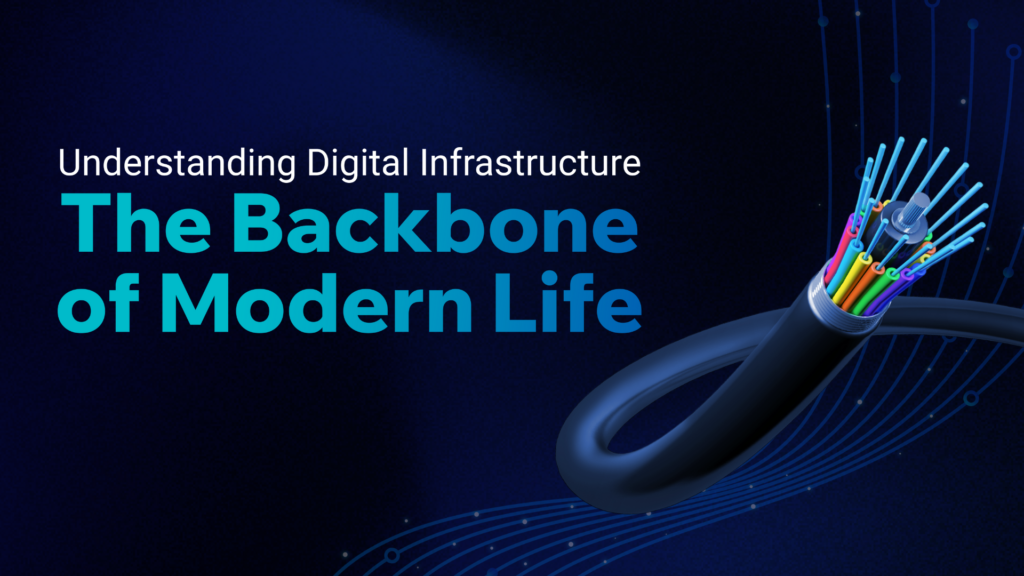
In today’s world, almost everything we do is powered by digital technology, from streaming movies to making online purchases. But have you ever wondered what makes all of this possible? Behind every app, website, and online service is something called digital infrastructure—the hidden framework that keeps the digital world running smoothly.
Let’s break it down in simple terms.
What is Digital Infrastructure?
Digital infrastructure is like the roads, bridges, and buildings of the internet. It refers to all the technology and systems that allow people, businesses, and devices to connect and share information. It’s the foundation that supports our digital economy.
Some key parts of digital infrastructure include:
● Data centers: These are giant facilities filled with servers (powerful computers) that store and process data. Every time you save a photo to the cloud or stream a song, data centers are working in the background.
● Networks: Think of networks like highways that transport information. These networks, which include fiber-optic cables and wireless signals, allow data to travel quickly between devices and servers.
● Cloud computing: This is a system that allows you to store data and run applications on the internet instead of on your personal device. It’s why you can access files from your phone or laptop anywhere with an internet connection.
Why is Digital Infrastructure Important?
Digital infrastructure makes our online experiences possible. Without it, we wouldn’t have the convenience of instant communication, online shopping, or even remote work. As more people come online and businesses go digital, a strong digital infrastructure becomes even more critical. Here are a few reasons why:
● Supports economic growth: As businesses move online, they need reliable digital infrastructure to operate. This helps industries grow, creates jobs, and encourages innovation.
● Enables connectivity: The more connected we are, the easier it is to collaborate, learn, and innovate. Digital infrastructure helps people from different parts of the world connect in real-time.
● Drives technological advancements: From AI to 5G networks, cutting-edge technologies rely on a strong digital foundation. Without it, progress would slow down.
Challenges in Telco Digital Infrastructure
The telecommunications (Telco) industry plays a major role in building and maintaining digital infrastructure. However, it faces unique challenges that impact how well digital infrastructure can support growing demands. Here are some of the key challenges faced by the Telco industry:
● Network Capacity and 5G Deployment:
With the rapid rise in data usage, video streaming, and IoT (Internet of Things) devices, network capacity is constantly under pressure. Telcos must invest in upgrading infrastructure to handle this massive traffic, and 5G deployment is a big part of this. However, rolling out 5G networks requires significant investment and the development of new infrastructure like small cells and fiber-optic connections, which can be time-consuming and expensive.
● Interoperability and Fragmentation:
One of the biggest hurdles for telcos is ensuring that different systems, networks, and equipment work together seamlessly. With so many vendors and technologies in the telecom ecosystem, achieving interoperability can be difficult. If networks aren’t compatible, it can lead to service interruptions or degraded quality, affecting user experience.
● Cybersecurity Threats:
As networks become more advanced, they are also more vulnerable to cyberattacks. Telecom networks carry massive amounts of sensitive data, making them prime targets for hackers. Telcos must invest in robust security systems and continually adapt to new threats. Failing to secure these networks can lead to significant data breaches and loss of trust.
● Infrastructure in Remote Areas:
Providing reliable network coverage in rural or underserved areas remains a challenge for telcos. Building towers and laying fiber-optic cables in remote locations is often costly and requires overcoming geographical challenges. Yet, extending digital infrastructure to these areas is crucial for bridging the digital divide and ensuring that everyone has access to high-speed internet.
● Sustainability and Energy Consumption:
Telecom infrastructure, especially data centers and 5G networks, consumes a large amount of energy. As telcos continue to expand their networks, they face increasing pressure to reduce their carbon footprint. This means finding ways to make their operations more energy-efficient, such as using renewable energy sources or optimizing network performance.
● Regulatory and Licensing Issues:
Governments often impose strict regulations on the telecom industry, from spectrum licensing to network deployment requirements. While these regulations are essential for ensuring fair competition and preventing monopolies, they can sometimes delay network expansion or increase costs for telcos.
The Future of Digital Infrastructure
The future is digital, and digital infrastructure will continue to evolve. Technologies like 5G and edge computing are set to make the internet faster and more efficient. Meanwhile, governments and businesses are investing heavily to expand infrastructure, ensuring that more people and places have access to the digital world.
As the foundation of our connected lives, digital infrastructure will remain critical in shaping the future of how we work, play, and communicate.
Digital infrastructure may not be something we think about often, but it is the unseen engine driving much of modern life. By understanding its role and importance, we can better appreciate the innovations and conveniences it brings. Whether it’s supporting new technologies or making the world more connected, digital infrastructure is key to building a more inclusive, efficient, and advanced digital future.
At DCConnect, we are committed to supporting and advancing digital infrastructure through innovative solutions that drive growth and efficiency in the telecommunications industry. If you’re interested in learning more or want to discuss how we can help your business, feel free to contact us at: alliance@dcconnectglobal.com
Author Biography:
Fatih Muhammad Ridwansyah, Digital Marketing Intern
DCConnect 全球
www.dcconnectglobal.com



